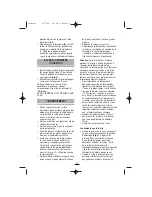
13
•
Place the appliance on a flat, stable,
horizontal surface well away from the
edge, and make sure that the cable is
not hanging over the side of the table or
work surface and is not touching any hot
surfaces.
•
Remove the cable from its housing at
the back of the fryer.
•
Remove the lid
(1)
, holding it by the
handle.
(2)
•
Before filling the fryer with oil or fat, all
the parts should be assembled and
completely dry.
•
Pour oil or fat into the pan up to between
the maximum and minimum level marks
etched on the inside. If using solid fat,
melt it first in a separate pan before
pouring into the fryer (See ‘Using with
solid fat’).
•
Do not mix different types of oil or fat
.
Do not add new oil or fat to used oil
or fat.
•
Plug the fryer into the mains.
•
Select the necessary temperature by
using the temperature control setting.
The pilot light will come on and the
heating element will start to function
Caution:
you must pre-heat the fryer for 15
minutes after switching it on in order to
reach the selected temperature. During this
time, the pilot light will come on and go off
for 3 or 4 cycles. After 15 minutes, the oil
temperature will be stable and can therefore
be used to fry the food. This step may
make the fryer perform better.
•
Select the required temperature using
the temperature control knob. When
selecting the temperature, be guided by
the information given on the packaging
of the food to be fried or by the
information table on the fryer.
•
When the pilot light switches off (10-15
minutes), this indicates that the oil/fat has
reached the selected temperature. The
pilot light will continue to switch on and off
in keeping with the thermostat cycles
throughout the entire cooking period.
If you wish to carry out a number of
continuous frying operations, wait until
the pilot light has switched off before
placing the next item of food in the
oil/fat.
•
Place the basket with the food slowly
into the oil to prevent any water in the
food from causing the oil to bubble up
over the sides of the pan.
•
Keep a close eye on the whole frying
process.
After frying
•
Remove the basket from the pan, shake
a little and then hook into the draining
position
(Fig. 3)
. Place the food on a
tray over a piece of absorbent kitchen
paper. While you are doing this, the oil
will have time to reach the right
temperature for the next frying operation
(the pilot light will switch off once again).
•
Use a strainer to remove any loose
particles of fried food that may have
come off the main pieces and are
floating in the oil. Leaving them to toast
will have a negative effect on the quality
of the oil.
•
When you have finished frying, turn the
thermostat switch to the ‘0’ position and
unplug the appliance from the mains. If
the fryer is used often, submerge the
basket in the oil and place the lid over
the top for protection.
•
Wait for the oil to cool completely before
disassembling and cleaning the fryer.
•
If you are not going to use the fryer for a
while, we recommend that you store the
oil or liquid fat in airtight recipients,
either in the fridge or in a cool place. Fill
the recipients by straining the oil or liquid
fat through a fine sieve to eliminate any
left-over particles of food.
•
If you have used solid fat, leave it to
solidify in the pan and then store the
fryer with the fat still in it. (See ‘Using
with solid fat’).
7. INSTRUCTIONS FOR USE
interior 19/7/06 08:38 Página 12















































